
Best AI Scribe (2026) – According to Real Online Forums

We read recent threads on open online forums to find what clinicians actually say after hands‑on use. Below you’ll find short, verbatim quotes (≤25 words) with links, plus pros and at least three cons for each tool. Where possible, we also cite official docs for workflow details.
How We Evaluated the AI Scribes
- Real‑world usage: clinician posts describing setup, accuracy, speed, and daily workflow impact.
- Transparency: pricing pages, help‑center docs, and deployment model (self‑serve vs. “book a demo”).
- Evidence weighting: we privilege firsthand user reports; when claims differ, we include both sides and cite sources you can read yourself.
1. Twofold Health: Best Overall AI Scribe for Small-Medium Practices
App store reviews:
- “This app has significantly reduced my documentation time while improving note quality.” Apple
- “Completely transformed the way I take patient notes.” Apple
Trustpilot reviews:
- “Twofold has made note taking effortless… minimal editing… support is SUPER responsive.” Trustpilot
- “Tried twofold today for the first time… Amazing!” Trustpilot
Pros
- Cuts charting time: multiple iOS reviewers report meaningful reductions in documentation time.
- EHR workflow fit: users specifically call out “seamless” EHR integration in practice.
- iOS and Android apps: mobile capture on both platforms; Android listing published in 2025. Apple
- HIPAA‑aligned: App Store description states HIPAA‑compliant AI; product pages emphasize encryption and compliance posture.
- Works across specialties: dedicated pages for primary care, physical therapy, and psychiatry (helps with template fit).
- Templates & personalization: supports SOAP/progress structures with custom instructions to match your voice.
- Simple EHR hand‑off: “one‑click to EHR” copy flow-no heavy integration needed to start.
- Positive third‑party sentiment beyond stores: Trustpilot reviews highlight minimal edits and responsive support. Trustpilot
- Self‑serve pilot: public site invites “Try for Free,” making it easy to trial without sales calls.
Cons
- Newer on Android (listing launched in 2025; long‑term Android review volume still developing).
- As with any AI scribe, clinician review is still required before signing.
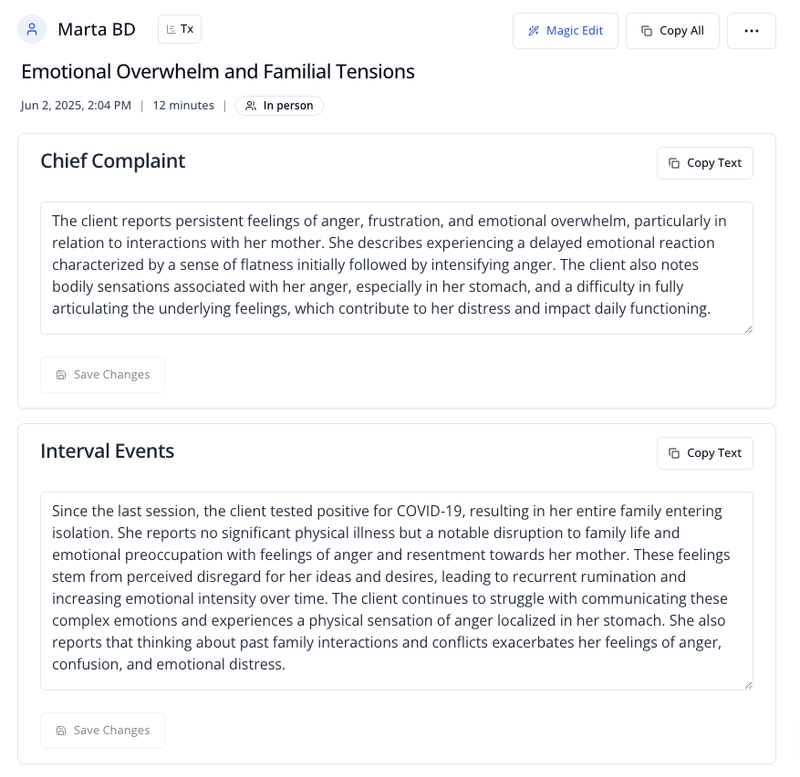
2. Abridge: Strong Epic Workflow Buzz, but Accuracy Varies by User
- “Cut my documentation from hours to seconds… allows me to be more present.” Apple
- “Not great for AI‑generated notes if accuracy is important-will drop key findings and at times invert statements.” Apple
Pros
- Multiple reviewers cite large time savings and easy phone/web interface.
- Highly rated overall on iOS at time of review.
Cons
- Reports of missed or inverted clinical details in AI notes for some users.
- Dictation mode “OK” but doesn’t filter filler words well, per one review.
- Still requires clinician review before sign‑off (as with all scribes).
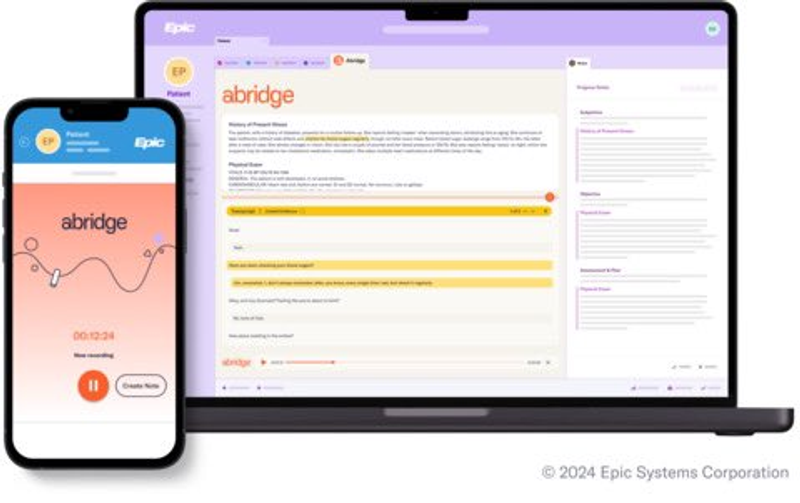
3. Suki: Mobile and Voice‑First; Mixed Specialty Performance
Representative quotes:
- “Near instant note completion… saving time and money compared to virtual scribes.” Apple
- “In oncology… notes are generic and repetitive… often misattributes speaker.” Apple
Pros
- Users highlight fast note generation and EHR use in daily workflow.
- Positive mobile reviews on Android reference accurate voice recognition. Google Play
Cons
- Specialty complaints (e.g., oncology drug names not recognized).
- Notes described as generic/repetitive by a dissatisfied user.
- Occasional speaker misattribution (clinician vs. patient) reported.
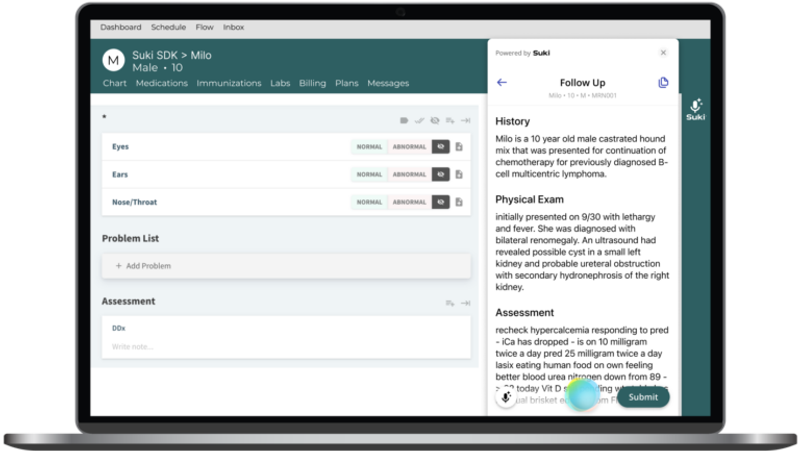
4. DeepScribe: Ambient Veteran; Time Savings vs. Inconsistency Reports
Representative quotes (G2):
- “Time saver… able to bill high with time.” G2
- “Results are inconsistent… missing big categories… have to add on every note.” G2
Pros
- Several clinicians cite HPI quality and time savings; integrations like DrChrono called out.
Cons
- Plan capture not always reliable; users report editing required.
- Complaints about redundancy/wordiness and inconsistent detail between sections.
- EHR gaps (e.g., “no interface with Intergy” per one review).
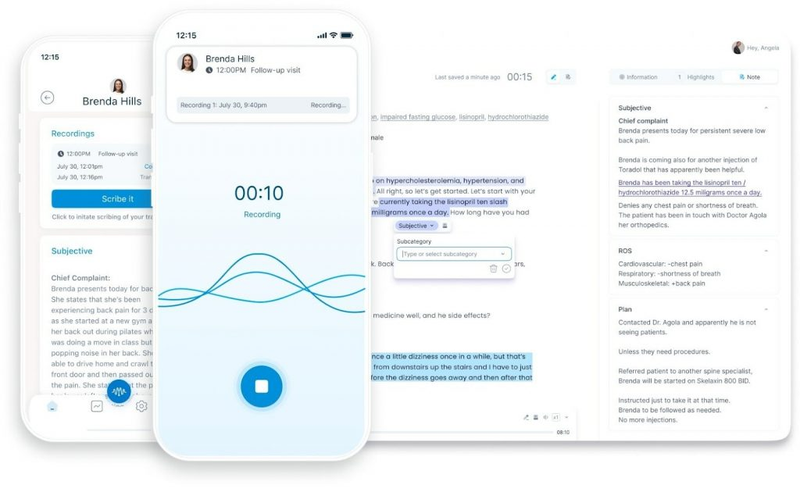
5. Augmedix: Human‑in‑the‑Loop Reliability; Not Truly “Instant”
Representative quotes (G2):
- “Scribes are professional… note writing so much more efficient.” G2
- “Best investment… given me back my personal time.” G2
Pros
- Users praise responsiveness and documentation quality in complex visits.
Cons
- Not instantaneous: hybrid/human‑in‑the‑loop options often mean minutes (e.g., 3–5) vs. seconds for full‑AI. Managed Healthcare Executive
- May involve additional hardware/workflow (e.g., wearable/stand), depending on product tier.
- Human‑supported models tend to be costlier than software‑only approaches (context on scribe costs from AAFP). AAFP
6. Freed AI: Popular Trial Pick; Several Complaints in iOS Reviews
Representative quotes (App Store):
- “Freed up to focus on my patients… captures our conversation.” Apple
- “Not ready for clinical use… notes poorly structured… took 10 minutes to edit.” Apple
- “Lost documentation… no one to call… bot sends to articles.” Apple
Pros
- Positive reviews mention multilingual encounters and faster documentation.
Cons
- Reports of structure/format issues and heavy editing.
- A user reports lost notes and limited live support.
- Mixed App Store rating (3.1/5 from 7 ratings at capture).
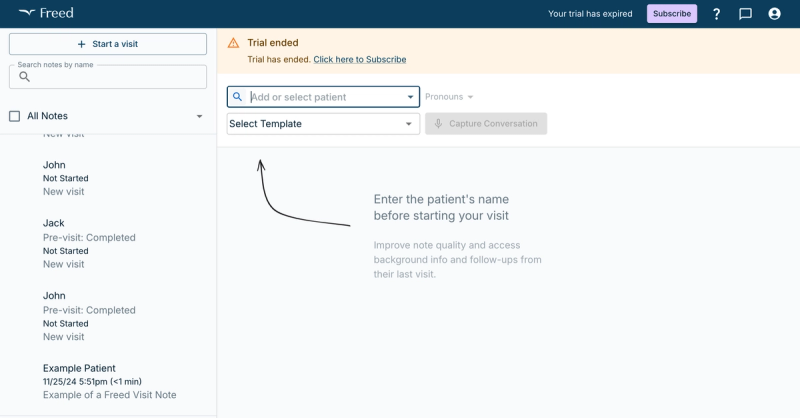
7. Hippo Scribe: Strong Rehab Buzz; Sparse Public Reviews
Representative quotes (open forums):
- “Game‑changer… streamlined documentation… more time focusing on patients.” (Chrome extension listing testimonial). Chrome Stats
Pros
- Real‑world therapists publicly endorse faster rehab documentation.
Cons
- Very few public app‑store reviews (iOS listing shows 1.0/5 from 1 rating).
- Much of the feedback lives in closed Facebook groups, making diligence harder.
- Independent, third‑party professional reviews are limited (outside vendor/testimonial pages).
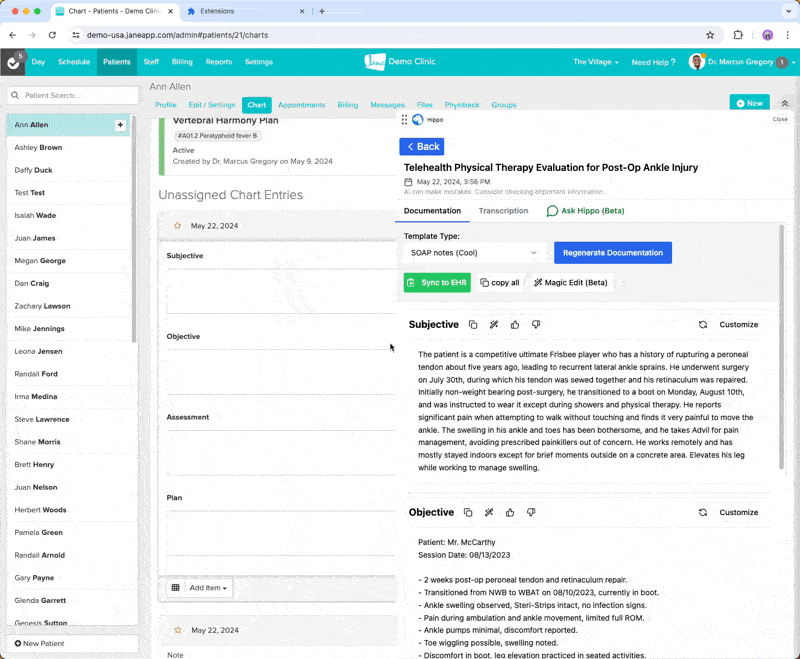
8. Athelas (Commure Ambient): Enterprise‑Leaning; Integration Praise with Caveats
Representative quotes (Play Store / Facebook groups):
- “Athelas is one of the most accurate and widely adopted AI scribes that integrates with eCW.” (eClinicalWorks user group) Facebook
- “Works ok most of time.” (Play Store review) Google Play
Pros
- Frequently cited by eCW users for integration.
Cons
- Mixed app feedback (e.g., “works ok most of time”).
- Product naming/branding can be confusing (Athelas Scribe → “Commure Ambient” in listings). Do diligence on SKUs.
- Few clinician‑written, scribe‑specific public reviews vs. broader Athelas/RPM apps.
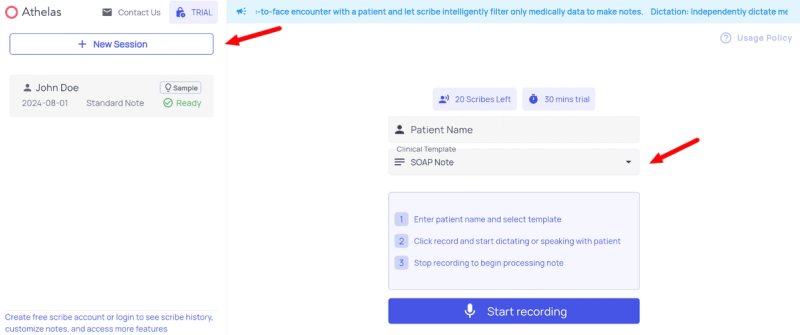
9. Heidi Health: Fast‑Growing, Especially in AU; Reliability Issues Noted by Some
Representative quotes (App Store / Google Play / Trustpilot):
- “I’m loving Heidi… Works flawlessly on PC… had hiccups until iOS update.” Apple
- “Only worked once in 11 appointments… extremely unreliable… crashes constantly.” (Android review) Google Play
Pros
- Positive reviews cite adaptability and support responsiveness.
Cons
- Multiple reports of app instability/crashes on Android.
- Some users needed iOS 18 for newer app versions to run smoothly.
- Rapid expansion means mixed user experiences in early deployments. The Australian
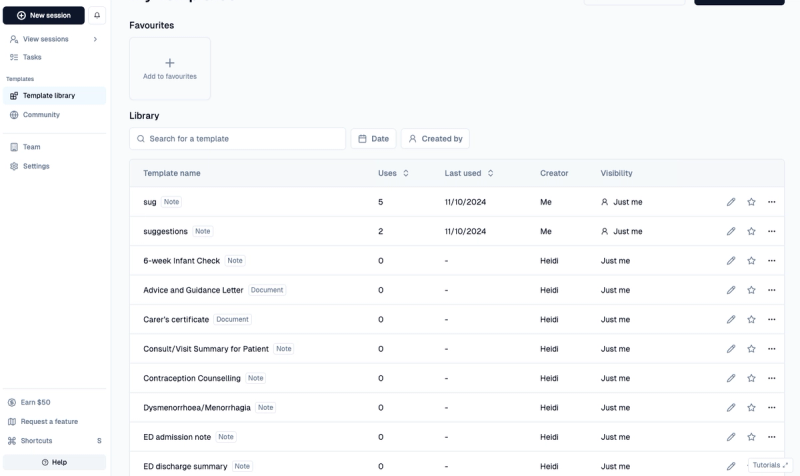
Best AI Scribe According to Online Forums: Comparison table
Vendor | Verdict | Top strengths | Watch-outs | Price (indicative) |
|---|---|---|---|---|
Twofold Health | Editor’s Pick | Very fast drafts, flexible templates, easy self-serve trial,high level accuracy and excellent support | Review before sign-off; EHR hand-off is usually copy-paste | $49/mo (annual) or $69/mo monthly |
Abridge | Strong for Epic/Athena users | Mobile + web, large org traction | Mixed accuracy reports; edits still needed | Enterprise/org-licensed |
Suki | Voice-first speed | Quick dictation → notes, solid voice recognition | Specialty variance; enterprise-leaning | Quote-based/premium |
Freed AI | Popular indy trial | Simple UI, clear onboarding | Structure/cleanup time in some workflows | ~$99/mo individual |
DeepScribe | Ambient veteran | Time savings for some, EHR ties | Inconsistent detail for some users; demo-gated | Quote-based (higher tiers) |
Augmedix | Human-in-the-loop reliability | Strong clinician support, complex visits | Not instant; usually pricier | Enterprise pricing |
Hippo Scribe | Rehab-focused | PT/OT-friendly workflows | Chrome-extension mapping; sparse public reviews | Free + paid plans |
Commure Ambient (Athelas) | System-level option | Integration narrative, eCW chatter | Demo-gated; opaque for individuals | Contact sales |
Last verified January 2026
How to Pick Your Recommended AI Scribe in 2026 (Quick Checklist)
- Pilot on your hardest visit types (multi‑problem, complex meds) and measure edit time per note.
- Verify EHR workflow you’ll actually use (true integration vs. copy‑paste).
- Ask about privacy defaults (audio retention, PHI handling, BAAs).
- Read recent App Store/Play Store/G2 comments for your specialty.
Conclusion: The Best AI Scribe According To Online Forums
Based on recent, real‑world comments across public app stores, G2, and open Facebook groups, Twofold Health is the recommended AI scribe for most independent clinicians and practices who want accuracy, minimal edits, and straightforward pricing ‑ with multiple iOS reviewers praising accuracy and workflow fit. If you’re in a large system or need a human‑in‑the‑loop safety net, Augmedix remains a credible enter
Frequently Asked Questions
ABOUT THE AUTHOR
Dr. Danni Steimberg
Licensed Medical Doctor
Reduce burnout,
improve patient care.
Join thousands of clinicians already using AI to become more efficient.

Best HIPAA Compliant AI Note Software (2026) – According to Real Reddit Reviews
Need privacy‑safe clinical notes? Compare 8 HIPAA‑compliant AI note‑taking apps praised (and panned) by Reddit clinicians and pick the right software for 2026

The Global Clinician: A Look At How AI Scribes Are Adapting (Or Not) Outside The US
Explore how AI medical scribes are adapting to healthcare systems, regulations, and challenges outside the United States.

How to Write BIRP Notes: Template, Examples & Tips
Learn how to write effective BIRP notes with a template, tips, and examples. Improve documentation, speed, and accuracy in mental health therapy sessions.

